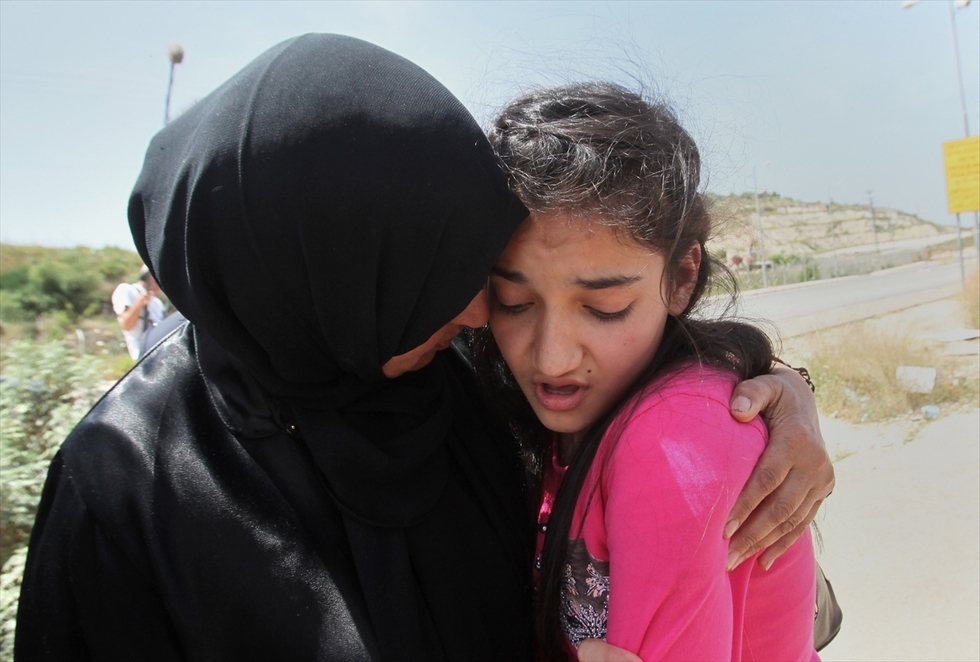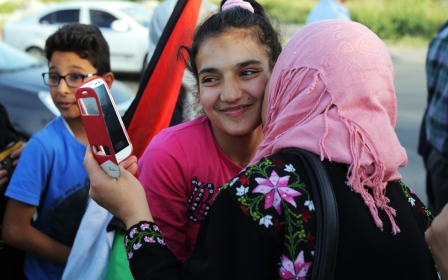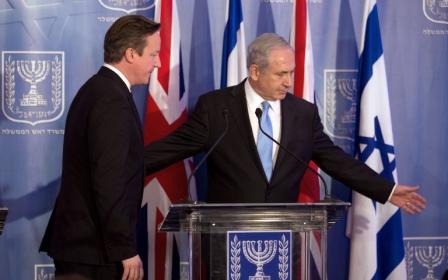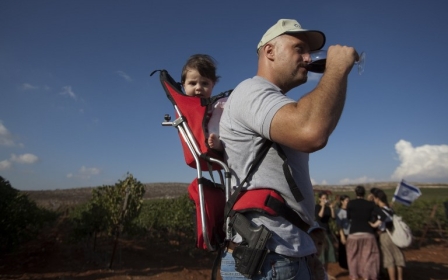Dima al-Wawi case highlights a decades-long Israeli war on children

On Sunday, Israel released 12-year-old Dima Wawi after imprisoning her for 10 weeks on charges of attempted manslaughter. Wawi had been convicted of carrying a concealed knife and attempting to stab an Israeli living in the illegal Karmei Tzur settlement.
The Palestinian youth was released two months before the end of her sentence. But had Wawi been Israeli, as an article in +972 has pointed out, she would not have been sent to jail at all. This is because Israel has two separate legal systems: civil law prohibits the jailing of anyone under 14, but under military law, which Palestinians are subject to, people as young as 12 can be jailed.
Wawi’s case brings into focus a decades-long war that Israel has been waging on Palestinian children.
This war is manifest in the Israeli security forces’ detention of Palestinian youth and violence against them, and in the ways Israel abrogates Palestinian children’s right to education. It is also evident in the psychological trauma that the authorities inflict on Palestinian children, and in the large numbers of Palestinian children that Israel routinely kills.
Just days before Wawi’s release, Defence for Children International-Palestine (DCIP), released a report called “No Way to Treat a Child”. The report details the systematic violence and injustices to which Palestinian children are subject in Israel’s military detention system.
DCIP collected affidavits from 429 West Bank children detained between 2012 and 2015 for the report, which concludes that the military detention system denies basic rights to Palestinians of all ages.
The report cites, for example, a 2014 US State Department report noting that a ludicrous 99 percent of Palestinian defendants in Israeli military courts are convicted. In 97 percent of the cases DCIP examined, children had no parent present or access to legal counsel while being interrogated by Israeli forces.
Israeli police did not properly inform Palestinian children of their rights 84 percent of the time. DCIP, furthermore, says the affidavits “show three-quarters of [Palestinian children in Israeli military detention] endured some form of physical violence following arrest.”
The number of Palestinian children enduring the military detention system has doubled since October, according to Human Rights Watch, which reports that “Israeli security forces are using unnecessary force in arresting and detaining children, in some cases beating them, and holding them in unsafe and abusive conditions.”
As of February, 440 Palestinians between the ages of 12 and 17 were being held in Israeli military detention. Another seven Palestinian children were in administrative detention, which is when a person is detained on the basis of an administrative order and without even an indictment or a trial.
The harm the Israeli state inflicts on Palestinian goes beyond those who are jailed. Palestinian children’s right to education is systematically undermined. UNICEF reports that Operation Protective Edge, Israel’s 2014 attack on Gaza, left 258 schools and kindergartens damaged, including 26 schools that are beyond repair and that access to education has “significantly deteriorated” in this territory.
In the West Bank, military checkpoints and the permit system impede the movement of all Palestinians, which means that travelling short distances can take hours and result in missed school classes.
Armed settlers and Israeli forces are so threatening to Palestinian children in the West Bank, that a UNICEF-supported protective accompaniment program has been established to help over 4,500 students and 350 teachers reach school safely.
Under this programme, international volunteers walk Palestinians to school and report on education-related violations. The Association for Civil Rights in Israel reports that in occupied East Jerusalem there are “striking discrepancies in resources allotted to Palestinian versus Jewish Israeli citizens,” which means that many of these Palestinian children “lack access to adequate education,” and that similar problems with access to and quality of education exist in cities inside Israel that have large Arab populations.
Israeli violence also inflicts grave psychological harm on Palestinian children.
UNICEF says that as a result of Operation Protective Edge “at least 373,000 children - nearly half of Gaza’s children - required direct and specialized psychosocial support". Palestinian youth detained by Israel “often suffer from long term psychological trauma.”
Fathy Flefel, a psychotherapist and director of the social department for the Palestinian Red Crescent Society, says that children in the West Bank undergo serious, prolonged trauma, in numbers that are “too big to determine” and that “Palestinian children live in trauma without end. It's never calm here, but the last two years have been especially bad.”
The bluntest expression of Israel’s war on Palestinian children is that it frequently kills large numbers of them. The Palestine Centre for Human Rights says that 318 Palestinian children were killed during Operation Cast Lead, Israel’s 23 day 2008-09 assault on Gaza.
Another 547 Palestinian children were killed during Protective Edge, DCIP reports. The group also finds that during the 2000-2005 Second Intifada, that Israeli forces and settlers killed more than 700 children. In the years since, at least 1,277 Palestinian children have been killed and there was an increase in the use of live ammunition against Palestinian children during 2015.
Israeli policies have devastating effects on Palestinian kids’ physical and psychological well-being and inhibit their ability to learn, to be productive, and to lead full, enriching lives.
Anyone who says they oppose mass violence against and oppression of children is obliged to back the Palestinians’ struggle. This is particularly true for people living in countries like the United States that give Israel the weapons it uses against Palestinian youth, and for citizens of states like Canada that elect governments that provide Israel with extensive material and ideological support, who can either support the Palestinian cause or continuing participating in a reprehensible war on children.
- Dr Gregory Shupak is an author and activist who teaches media studies at the University of Guelph in Canada.
The views expressed in this article belong to the author and do not necessarily reflect the editorial policy of Middle East Eye.
Photo: The youngest Palestinian prisoner, aged 12, Dima al-Wawi (R) hugs her mother after she was released from Israeli prison, at Jibaara check point in Tulkarem, West Bank on 24 April, 2016 (AA).
Middle East Eye propose une couverture et une analyse indépendantes et incomparables du Moyen-Orient, de l’Afrique du Nord et d’autres régions du monde. Pour en savoir plus sur la reprise de ce contenu et les frais qui s’appliquent, veuillez remplir ce formulaire [en anglais]. Pour en savoir plus sur MEE, cliquez ici [en anglais].





